高级英语lesson2原文及翻译
- 格式:doc
- 大小:48.00 KB
- 文档页数:9
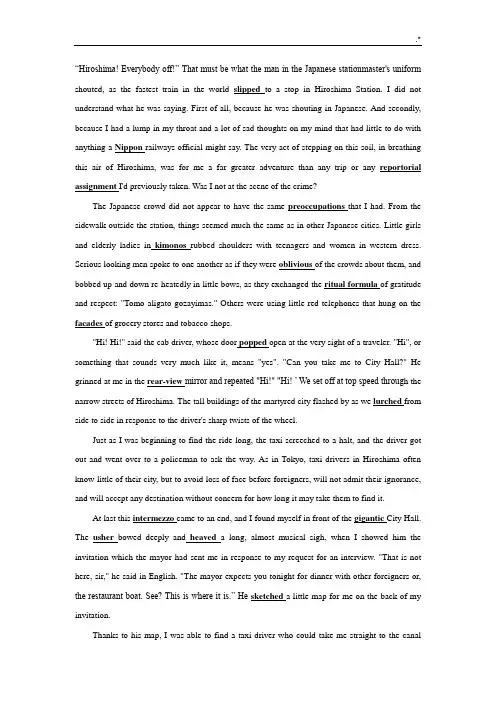
“Hiroshima! Everybody off!” That must be what the man in the Japanese stationmaster's uniform shouted, as the fastest train in the world slipped to a stop in Hiroshima Station. I did not understand what he was saying. First of all, because he was shouting in Japanese. And secondly, because I had a lump in my throat and a lot of sad thoughts on my mind that had little to do with anything a Nippon railways official might say. The very act of stepping on this soil, in breathing this air of Hiroshima, was for me a far greater adventure than any trip or any reportorial assignment I'd previously taken. Was I not at the scene of the crime?The Japanese crowd did not appear to have the same preoccupations that I had. From the sidewalk outside the station, things seemed much the same as in other Japanese cities. Little girls and elderly ladies in kimonos rubbed shoulders with teenagers and women in western dress. Serious looking men spoke to one another as if they were oblivious of the crowds about them, and bobbed up and down re-heatedly in little bows, as they exchanged the ritual formula of gratitude and respect: "Tomo aligato gozayimas." Others were using little red telephones that hung on the facades of grocery stores and tobacco shops."Hi! Hi!" said the cab driver, whose door popped open at the very sight of a traveler. "Hi", or something that sounds very much like it, means "yes". "Can you take me to City Hall?" He grinned at me in the rear-view mirror and repeated "Hi!" "Hi! ’ We set off at top speed throug h the narrow streets of Hiroshima. The tall buildings of the martyred city flashed by as we lurched from side to side in response to the driver's sharp twists of the wheel.Just as I was beginning to find the ride long, the taxi screeched to a halt, and the driver got out and went over to a policeman to ask the way. As in Tokyo, taxi drivers in Hiroshima often know little of their city, but to avoid loss of face before foreigners, will not admit their ignorance, and will accept any destination without concern for how long it may take them to find it.At last this intermezzo came to an end, and I found myself in front of the gigantic City Hall. The usher bowed deeply and heaved a long, almost musical sigh, when I showed him the invitation which the mayor had sent me in response to my request for an interview. "That is not here, sir," he said in English. "The mayor expects you tonight for dinner with other foreigners or, the restaurant boat. See? This is where it is.” He sketched a little map for me on the back of my invitation.Thanks to his map, I was able to find a taxi driver who could take me straight to the canalembankment , where a sort of barge with a roof like one on a Japanese house was moored . The Japanese build their traditional houses on boats when land becomes too expensive. The rather arresting spectacle of little old Japan adrift adrift amid beige concrete skyscrapers is the very symbol of the incessant struggle between the kimono and the miniskirt.At the door to the restaurant, a stunning, porcelain-faced woman in traditional costume asked me to remove my shoes. This done, I entered one of the low-ceilinged rooms of the little floating house, treading cautiously on the soft matting and experiencing a twinge of embarrassment at the prospect of meeting the mayor of Hiroshima in my socks.He was a tall, thin man, sad-eyed and serious. Quite unexpectedly, the strange emotion which had overwhelmed me at the station returned, and I was again crushed by the thought that I now stood on the site of the first atomic bombardment, where thousands upon thousands of people had been slain in one second, where thousands upon thousands of others had lingered on to die in slow agony .The introductions were made. Most of the guests were Japanese, and it was difficult for me to ask them just why we were gathered here. The few Americans and Germans seemed just as inhibited as I was. "Gentlemen," said the mayor, "I am happy to welcome you to Hiroshima."Everyone bowed, including the Westerners. After three days in Japan, the spinal column becomes extraordinarily flexible."Gentlemen, it is a very great honor to have you her e in Hiroshima."There were fresh bows, and the faces grew more and more serious each time the name Hiroshima was repeated."Hiroshi ma, as you know, is a city familiar to everyone,” continued the mayor."Yes, yes, of course,” murmured the company, more and more agitated."Seldom has a city gained such world renown, and I am proud and happy to welcome you to Hiroshima, a town known throughout the world for its--- oysters".I was just about to make my little bow of assent, when the meaning of these last words sank in, jolting me out of my sad reverie ."Hiroshima –oysters? What about the bomb and the misery and humanity's most heinous crime?" While the mayor went on with his speech in praise of southern Japanese sea food, I cautiously backed away and headed toward the far side of the room, where a few men were talkingamong themselves and paying little attention to the mayor's speech. "You look puzzled," said a small Japanese man with very large eye-glasses."Well, I must confess that I did not expect a speech about oysters here. I thought that Hiroshima still felt the impact of the atomic impact .""No one talks about it any more, and no one wants to, especially, the people who were born here or who lived through it. "Do you feel the same way, too?""I was here, but I was not in the center of town. I tell you this because I am almost an old man. There are two different schools of thought in this city of oysters, one that would like to preserve traces of the bomb, and the other that would like to get rid of everything, even the monument that was erected at the point of impact. They would also like to demolish the atomic museum.""Why would they want to do that?""Because it hurts everybody, and because time marches on. That is why." The small Japanese man smiled, his eyes nearly closed behind their thick lenses. "If you write about this city, do not forget to say that it is the gayest city in Japan, even it many of the town's people still bear hidden wounds, and burns."Like any other, the hospital smelled of formaldehyde and ethere . Stretchers and wheelchairs lined the walls of endless corridors, and nurses walked by carrying Stretchers instruments, the very sight of which would send shivers down the spine of any healthy visitor. The so-called atomic section was located on the third floor. It consisted of 17 beds."I am a fisherman by trade. I have been here a very long time, more than twenty years, "said an old man in Japanese pajamas. “What is wrong with you?”"Something inside. I was in Hiroshima when it happened. I saw the fire ball. But I had no burns on my face or body. I ran all over the city looking for missing friends and relatives. I thought somehow I had been spared. But later my hair began to fall out, and my belly turned to water. I felt sick, and ever since then they have been testing and treating me. " The doctor at my side explained and commented upon the old man's story, "We still hare a handful of patients here who are being kept alive by constant car e. The other s died as a result of their injuries, or else committed suicide . ""Why did they commit suicide?""It is humiliating to survive in this city. If you bear any visible scars of atomic burns, your children will encounter prejudice on the par t of those who do not. No one will marry the daughter or the niece of an atomic bomb victim. People are afraid of genetic damage from the radiation." The old fisherman gazed at me politely and with interest.Hanging over the patient was a big ball made of bits of brightly colored paper, folded into the shape of tiny birds. "What's that?" I asked."Those are my lucky birds. Each day that I escape death, each day of suffering that helps to free me from earthly cares, I make a new little paper bird, and add it to the others. This way I look at them and congratulate myself of the good fortune that my illness has brought me. Because, thanks to it, I have the opportunity to improve my character."Once again, outside in the open air, I tore into little pieces a small notebook with questions that I'd prepared in advance for inter views with the patients of the atomic ward. Among them was the question: Do you really think that Hiroshima is the liveliest city in Japan? I never asked it. But I could read the answer in every eye.“广岛到了!大家请下车!”当世界上最快的高速列车减速驶进广岛车站并渐渐停稳时,那位身着日本火车站站长制服的男人口中喊出的一定是这样的话。
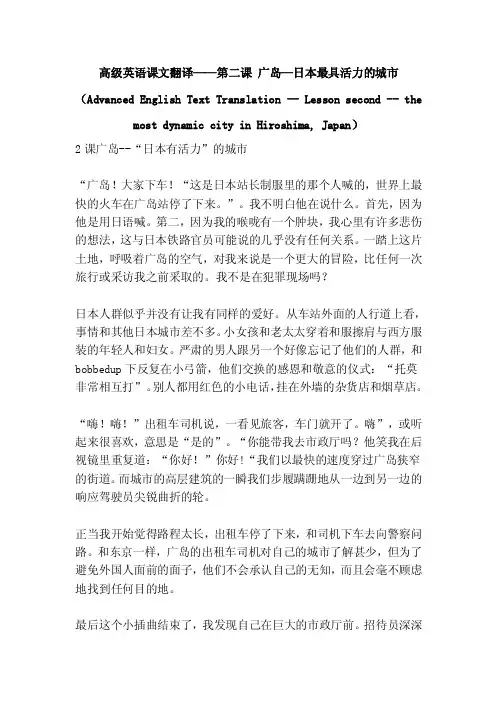
高级英语课文翻译——第二课广岛—日本最具活力的城市(Advanced English Text Translation -- Lesson second -- the most dynamic city in Hiroshima, Japan)2课广岛--“日本有活力”的城市“广岛!大家下车!“这是日本站长制服里的那个人喊的,世界上最快的火车在广岛站停了下来。
”。
我不明白他在说什么。
首先,因为他是用日语喊。
第二,因为我的喉咙有一个肿块,我心里有许多悲伤的想法,这与日本铁路官员可能说的几乎没有任何关系。
一踏上这片土地,呼吸着广岛的空气,对我来说是一个更大的冒险,比任何一次旅行或采访我之前采取的。
我不是在犯罪现场吗?日本人群似乎并没有让我有同样的爱好。
从车站外面的人行道上看,事情和其他日本城市差不多。
小女孩和老太太穿着和服擦肩与西方服装的年轻人和妇女。
严肃的男人跟另一个好像忘记了他们的人群,和bobbedup下反复在小弓箭,他们交换的感恩和敬意的仪式:“托莫非常相互打”。
别人都用红色的小电话,挂在外墙的杂货店和烟草店。
“嗨!嗨!”出租车司机说,一看见旅客,车门就开了。
嗨”,或听起来很喜欢,意思是“是的”。
“你能带我去市政厅吗?他笑我在后视镜里重复道:“你好!”你好!“我们以最快的速度穿过广岛狭窄的街道。
而城市的高层建筑的一瞬我们步履蹒跚地从一边到另一边的响应驾驶员尖锐曲折的轮。
正当我开始觉得路程太长,出租车停了下来,和司机下车去向警察问路。
和东京一样,广岛的出租车司机对自己的城市了解甚少,但为了避免外国人面前的面子,他们不会承认自己的无知,而且会毫不顾虑地找到任何目的地。
最后这个小插曲结束了,我发现自己在巨大的市政厅前。
招待员深深地鞠了一躬,发出一声长长的、几乎是音乐般的叹息,当我把市长要求我接受采访的邀请送给他时,我给他看了一声。
不是这儿,先生,”他用英语说。
”市长希望你今晚和餐馆里的其他外国人一起吃饭。
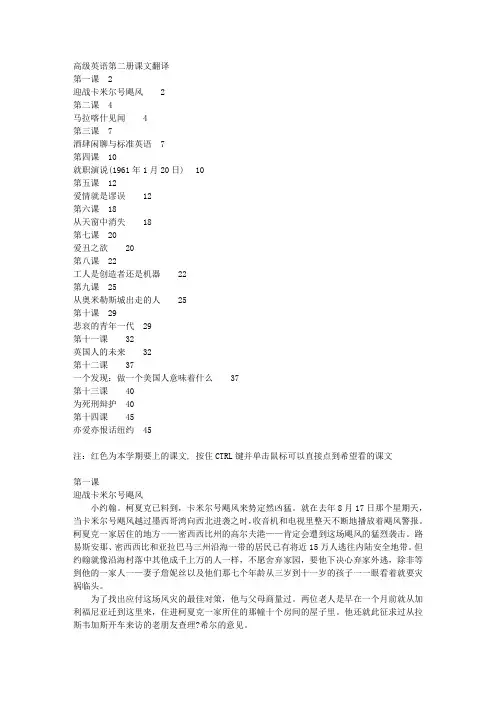
高级英语第二册课文翻译第一课 2迎战卡米尔号飓风 2第二课 4马拉喀什见闻 4第三课7酒肆闲聊与标准英语7第四课10就职演说(1961年1月20日) 10第五课12爱情就是谬误12第六课18从天窗中消失18第七课20爱丑之欲20第八课22工人是创造者还是机器22第九课25从奥米勒斯城出走的人25第十课29悲哀的青年一代29第十一课32英国人的未来32第十二课37一个发现:做一个美国人意味着什么37第十三课40为死刑辩护40第十四课45亦爱亦恨话纽约45注:红色为本学期要上的课文, 按住CTRL键并单击鼠标可以直接点到希望看的课文第一课迎战卡米尔号飓风小约翰。
柯夏克已料到,卡米尔号飓风来势定然凶猛。
就在去年8月17日那个星期天,当卡米尔号飓风越过墨西哥湾向西北进袭之时,收音机和电视里整天不断地播放着飓风警报。
柯夏克一家居住的地方一—密西西比州的高尔夫港——肯定会遭到这场飓风的猛烈袭击。
路易斯安那、密西西比和亚拉巴马三州沿海一带的居民已有将近15万人逃往内陆安全地带。
但约翰就像沿海村落中其他成千上万的人一样,不愿舍弃家园,要他下决心弃家外逃,除非等到他的一家人一—妻子詹妮丝以及他们那七个年龄从三岁到十一岁的孩子一一眼看着就要灾祸临头。
为了找出应付这场风灾的最佳对策,他与父母商量过。
两位老人是早在一个月前就从加利福尼亚迁到这里来,住进柯夏克一家所住的那幢十个房间的屋子里。
他还就此征求过从拉斯韦加斯开车来访的老朋友查理?希尔的意见。
约翰的全部产业就在自己家里(他开办的玛格纳制造公司是设计、研制各种教育玩具和教育用品的。
公司的一切往来函件、设计图纸和工艺模具全都放在一楼)。
37岁的他对飓风的威力是深有体会的。
四年前,他原先拥有的位于高尔夫港以西几英里外的那个家就曾毁于贝翠号飓风(那场风灾前夕柯夏克已将全家搬到一家汽车旅馆过夜)。
不过,当时那幢房子所处的地势偏低,高出海平面仅几英尺。
“我们现在住的这幢房子高了23英尺,,’他对父亲说,“而且距离海边足有250码远。

青年⼈的四种选择 Lesson 2 Four Choices for Young People 在毕业前不久,斯坦福⼤学四年级主席吉姆?宾司给我写了⼀封信,信中谈及他的⼀些不安。
Shortly before his graduation, Jim Binns, president of the senior class at Stanford University, wrote me about some of his misgivings. 他写道:“与其他任何⼀代⼈相⽐,我们这⼀代⼈在看待成⼈世界时抱有更⼤的疑虑……同时越来越倾向于全盘否定成⼈世界。
” “More than any other generation,” he said, “our generation views the adult world with great skepticism… there is also an increased tendency to reject completely that world.” 很明显,他的话代表了许多同龄⼈的看法。
Apparently he speaks for a lot of his contemporaries. 在过去的⼏年⾥,我倾听过许多年轻⼈的谈话,他们有的还在⼤学读书,有的已经毕业,他们对于成⼈的世界同样感到不安。
During the last few years, I have listened to scores of young people, in college and out, who were just as nervous about the grown world. ⼤致来说,他们的态度可归纳如下:“这个世界乱糟糟的,到处充满了不平等、贫困和战争。
对此该负责的⼤概应是那些管理这个世界的成年⼈吧。
如果他们不能做得⽐这些更好,他们⼜能拿什么来教育我们呢?这样的教导,我们根本不需要。
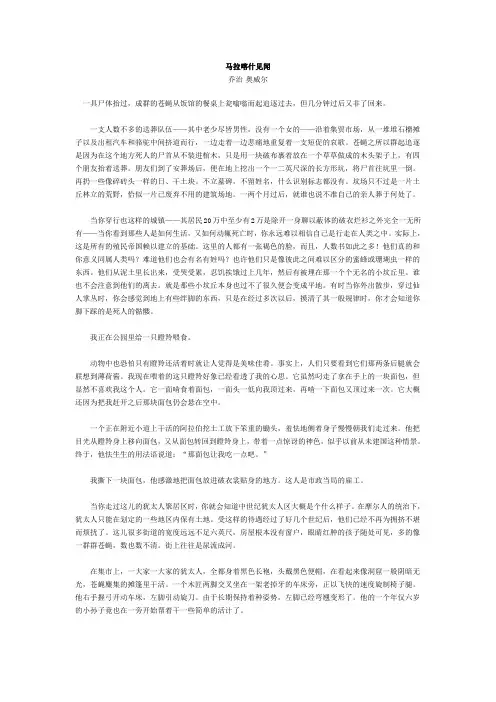
马拉喀什见闻乔治·奥威尔一具尸体抬过,成群的苍蝇从饭馆的餐桌上瓮嗡嗡而起追逐过去,但几分钟过后又非了回来。
一支人数不多的送葬队伍——其中老少尽皆男性,没有一个女的——沿着集贸市场,从一堆堆石榴摊子以及出租汽车和骆驼中间挤道而行,一边走着一边悲痛地重复着一支短促的哀歌。
苍蝇之所以群起追逐是因为在这个地方死人的尸首从不装进棺木,只是用一块破布裹着放在一个草草做成的木头架子上,有四个朋友抬着送葬。
朋友们到了安葬场后,便在地上挖出一个一二英尺深的长方形坑,将尸首往坑里一倒。
再扔一些像碎砖头一样的日、干土块。
不立墓碑,不留姓名,什么识别标志都没有。
坟场只不过是一片土丘林立的荒野,恰似一片已废弃不用的建筑场地。
一两个月过后,就谁也说不准自己的亲人葬于何处了。
当你穿行也这样的城镇——其居民20万中至少有2万是除开一身聊以蔽体的破衣烂衫之外完全一无所有——当你看到那些人是如何生活,又如何动辄死亡时,你永远难以相信自己是行走在人类之中。
实际上,这是所有的殖民帝国赖以建立的基础。
这里的人都有一张褐色的脸,而且,人数书如此之多!他们真的和你意义同属人类吗?难道他们也会有名有姓吗?也许他们只是像彼此之间难以区分的蜜蜂或珊瑚虫一样的东西。
他们从泥土里长出来,受哭受累,忍饥挨饿过上几年,然后有被埋在那一个个无名的小坟丘里。
谁也不会注意到他们的离去。
就是那些小坟丘本身也过不了很久便会变成平地。
有时当你外出散步,穿过仙人掌丛时,你会感觉到地上有些绊脚的东西,只是在经过多次以后,摸清了其一般规律时,你才会知道你脚下踩的是死人的骷髅。
我正在公园里给一只瞪羚喂食。
动物中也恐怕只有瞪羚还活着时就让人觉得是美味佳肴。
事实上,人们只要看到它们那两条后腿就会联想到薄荷酱。
我现在喂着的这只瞪羚好象已经看透了我的心思。
它虽然叼走了拿在手上的一块面包,但显然不喜欢我这个人。
它一面啃食着面包,一面头一低向我顶过来,再啃一下面包又顶过来一次。
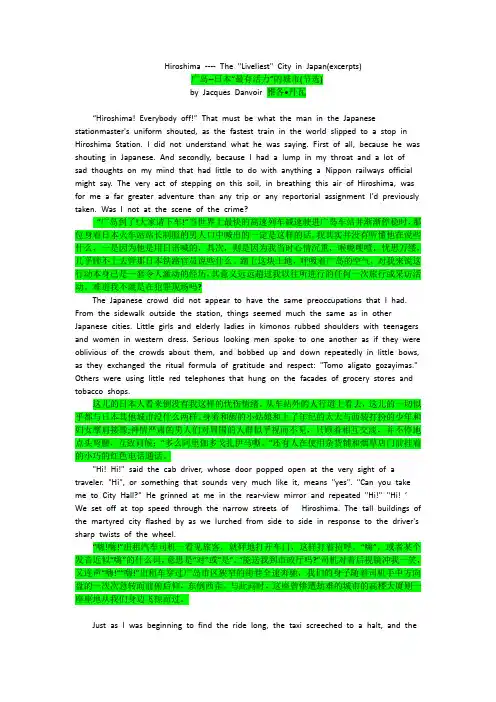
Hiroshima ---- The "Liveliest" City in Japan(excerpts)广岛--日本“最有活力”的城市(节选)by Jacques Danvoir 雅各•丹瓦“Hiroshima!Everybody off!”That must be what the man in the Japanese stationmaster's uniform shouted, as the fastest train in the world slipped to a stop in Hiroshima Station. I did not understand what he was saying. First of all, because he was shouting in Japanese. And secondly, because I had a lump in my throat and a lot ofsad thoughts on my mind that had little to do with anything a Nippon railways official might say. The very act of stepping on this soil, in breathing this air of Hiroshima, was for me a far greater adventure than any trip or any reportorial assignment I'd previously taken. Was I not at the scene of the crime?“广岛到了!大家请下车!”当世界上最快的高速列车减速驶进广岛车站并渐渐停稳时,那位身着日本火车站站长制服的男人口中喊出的一定是这样的话。
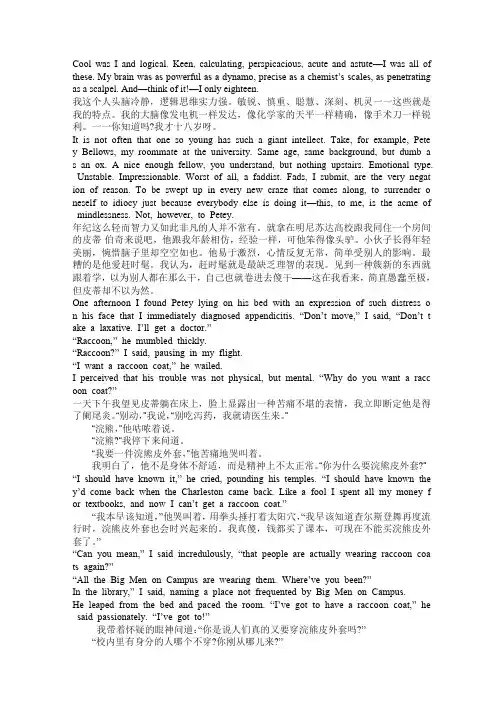
Cool was I and logical. Keen, calculating, perspicacious, acute and astute—I was all of these. My brain was as powerful as a dynamo, precise as a chemist’s scales, as penetrating as a scalpel. And—think of it!—I only eighteen.我这个人头脑冷静,逻辑思维实力强。
敏锐、慎重、聪慧、深刻、机灵一一这些就是我的特点。
我的大脑像发电机一样发达,像化学家的天平一样精确,像手术刀一样锐利。
一一你知道吗?我才十八岁呀。
It is not often that one so young has such a giant intellect. Take, for example, Pete y Bellows, my roommate at the university. Same age, same background, but dumb a s an ox. A nice enough fellow, you understand, but nothing upstairs. Emotional type. Unstable. Impressionable. Worst of all, a faddist. Fads, I submit, are the very negat ion of reason. To be swept up in every new craze that comes along, to surrender o neself to idiocy just because everybody else is doing it—this, to me, is the acme of mindlessness. Not, however, to Petey.年纪这么轻而智力又如此非凡的人并不常有。
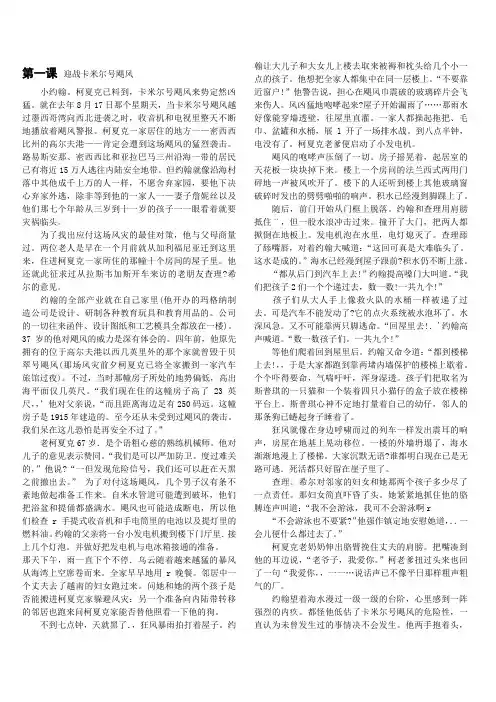
第一课迎战卡米尔号飓风小约翰。
柯夏克已料到,卡米尔号飓风来势定然凶猛。
就在去年8月17日那个星期天,当卡米尔号飓风越过墨西哥湾向西北进袭之时,收音机和电视里整天不断地播放着飓风警报。
柯夏克一家居住的地方一—密西西比州的高尔夫港——肯定会遭到这场飓风的猛烈袭击。
路易斯安那、密西西比和亚拉巴马三州沿海一带的居民已有将近15万人逃往内陆安全地带。
但约翰就像沿海村落中其他成千上万的人一样,不愿舍弃家园,要他下决心弃家外逃,除非等到他的一家人一—妻子詹妮丝以及他们那七个年龄从三岁到十一岁的孩子一一眼看着就要灾祸临头。
为了找出应付这场风灾的最佳对策,他与父母商量过。
两位老人是早在一个月前就从加利福尼亚迁到这里来,住进柯夏克一家所住的那幢十个房间的屋子里。
他还就此征求过从拉斯韦加斯开车来访的老朋友查理?希尔的意见。
约翰的全部产业就在自己家里(他开办的玛格纳制造公司是设计、研制各种教育玩具和教育用品的。
公司的一切往来函件、设计图纸和工艺模具全都放在一楼)。
37岁的他对飓风的威力是深有体会的。
四年前,他原先拥有的位于高尔夫港以西几英里外的那个家就曾毁于贝翠号飓风(那场风灾前夕柯夏克已将全家搬到一家汽车旅馆过夜)。
不过,当时那幢房子所处的地势偏低,高出海平面仅几英尺。
“我们现在住的这幢房子高了23英尺,,’他对父亲说,“而且距离海边足有250码远。
这幢房子是1915年建造的。
至今还从未受到过飓风的袭击。
我们呆在这儿恐怕是再安全不过了。
”老柯夏克67岁.是个语粗心慈的熟练机械师。
他对儿子的意见表示赞同。
“我们是可以严加防卫。
度过难关的,”他说?“一但发现危险信号,我们还可以赶在天黑之前撤出去。
”为了对付这场飓风,几个男子汉有条不紊地做起准备工作来。
自米水管道可能遭到破坏,他们把浴盆和提俑都盛满水。
飓风也可能造成断电,所以他们检查r手提式收音机和手电筒里的电池以及提灯里的燃料油。
约翰的父亲将一台小发电机搬到楼下门厅里.接上几个灯泡。
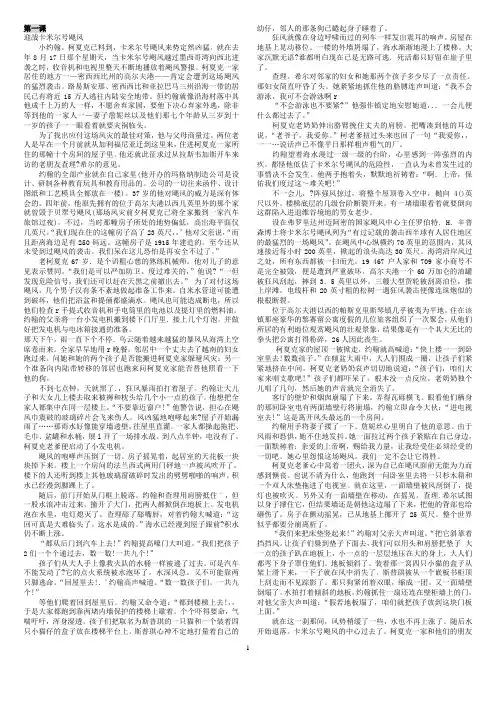
第一课迎战卡米尔号飓风小约翰。
柯夏克已料到,卡米尔号飓风来势定然凶猛。
就在去年8月17日那个星期天,当卡米尔号飓风越过墨西哥湾向西北进袭之时,收音机和电视里整天不断地播放着飓风警报。
柯夏克一家居住的地方一—密西西比州的高尔夫港——肯定会遭到这场飓风的猛烈袭击。
路易斯安那、密西西比和亚拉巴马三州沿海一带的居民已有将近15万人逃往内陆安全地带。
但约翰就像沿海村落中其他成千上万的人一样,不愿舍弃家园,要他下决心弃家外逃,除非等到他的一家人一—妻子詹妮丝以及他们那七个年龄从三岁到十一岁的孩子一一眼看着就要灾祸临头。
为了找出应付这场风灾的最佳对策,他与父母商量过。
两位老人是早在一个月前就从加利福尼亚迁到这里来,住进柯夏克一家所住的那幢十个房间的屋子里。
他还就此征求过从拉斯韦加斯开车来访的老朋友查理?希尔的意见。
约翰的全部产业就在自己家里(他开办的玛格纳制造公司是设计、研制各种教育玩具和教育用品的。
公司的一切往来函件、设计图纸和工艺模具全都放在一楼)。
37岁的他对飓风的威力是深有体会的。
四年前,他原先拥有的位于高尔夫港以西几英里外的那个家就曾毁于贝翠号飓风(那场风灾前夕柯夏克已将全家搬到一家汽车旅馆过夜)。
不过,当时那幢房子所处的地势偏低,高出海平面仅几英尺。
“我们现在住的这幢房子高了23英尺,,’他对父亲说,“而且距离海边足有250码远。
这幢房子是1915年建造的。
至今还从未受到过飓风的袭击。
我们呆在这儿恐怕是再安全不过了。
”老柯夏克67岁.是个语粗心慈的熟练机械师。
他对儿子的意见表示赞同。
“我们是可以严加防卫。
度过难关的,”他说?“一但发现危险信号,我们还可以赶在天黑之前撤出去。
”为了对付这场飓风,几个男子汉有条不紊地做起准备工作来。
自米水管道可能遭到破坏,他们把浴盆和提俑都盛满水。
飓风也可能造成断电,所以他们检查r手提式收音机和手电筒里的电池以及提灯里的燃料油。
约翰的父亲将一台小发电机搬到楼下门厅里.接上几个灯泡。
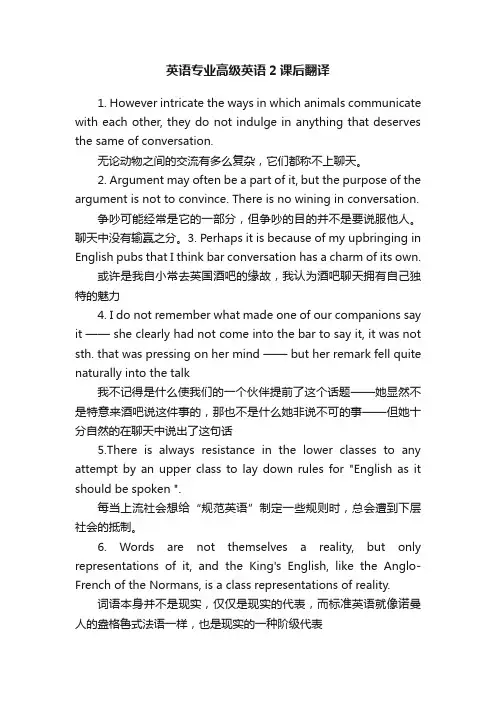
英语专业高级英语2课后翻译1. However intricate the ways in which animals communicate with each other, they do not indulge in anything that deserves the same of conversation.无论动物之间的交流有多么复杂,它们都称不上聊天。
2. Argument may often be a part of it, but the purpose of the argument is not to convince. There is no wining in conversation.争吵可能经常是它的一部分,但争吵的目的并不是要说服他人。
聊天中没有输赢之分。
3. Perhaps it is because of my upbringing in English pubs that I think bar conversation has a charm of its own.或许是我自小常去英国酒吧的缘故,我认为酒吧聊天拥有自己独特的魅力4. I do not remember what made one of our companions say it —— she clearly had not come into the bar to say it, it was not sth. that was pressing on her mind —— but her remark fell quite naturally into the talk我不记得是什么使我们的一个伙伴提前了这个话题——她显然不是特意来酒吧说这件事的,那也不是什么她非说不可的事——但她十分自然的在聊天中说出了这句话5.There is always resistance in the lower classes to any attempt by an upper class to lay down rules for "English as it should be spoken ".每当上流社会想给“规范英语”制定一些规则时,总会遭到下层社会的抵制。
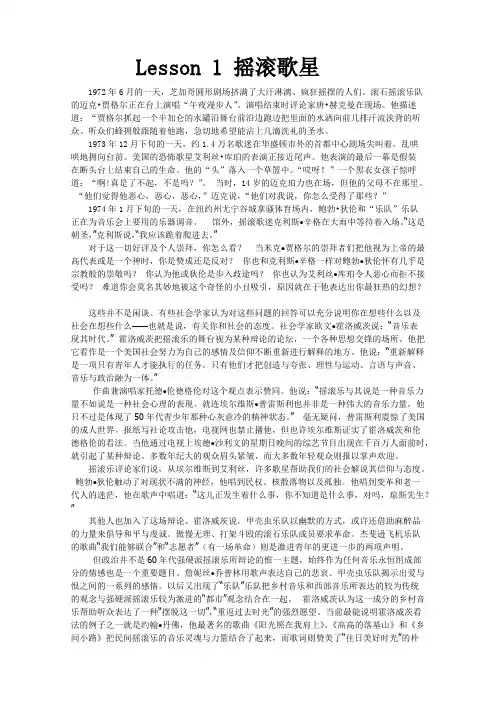
Lesson 1 摇滚歌星1972年6月的一天,芝加哥圆形剧场挤满了大汗淋漓、疯狂摇摆的人们。
滚石摇滚乐队的迈克•贾格尔正在台上演唱“午夜漫步人”。
演唱结束时评论家唐•赫克曼在现场。
他描述道:“贾格尔抓起一个半加仑的水罐沿舞台前沿边跑边把里面的水洒向前几排汗流浃背的听众。
听众们蜂拥般跟随着他跑,急切地希望能沾上几滴洗礼的圣水。
1973年12月下旬的一天,约1.4万名歌迷在华盛顿市外的首都中心剧场尖叫着,乱哄哄地拥向台前。
美国的恐怖歌星艾利丝•库珀的表演正接近尾声。
他表演的最后一幕是假装在断头台上结束自己的生命。
他的“头”落入一个草篮中。
“哎呀!”一个黑衣女孩子惊呼道:“啊!真是了不起,不是吗?”。
当时,14岁的迈克珀力也在场,但他的父母不在那里。
“他们觉得他恶心,恶心,恶心,”迈克说,“他们对我说,你怎么受得了那些?”1974年1月下旬的一天,在纽约州尤宁谷城拿骚体育场内,鲍勃•狄伦和“乐队”乐队正在为音乐会上要用的乐器调音。
馆外,摇滚歌迷克利斯•辛格在大雨中等待着入场。
“这是朝圣,”克利斯说,“我应该跪着爬进去。
”对于这一切好评及个人崇拜,你怎么看?当米克•贾格尔的崇拜者们把他视为上帝的最高代表或是一个神时,你是赞成还是反对?你也和克利斯•辛格一样对鲍勃•狄伦怀有几乎是宗教般的崇敬吗?你认为他或狄伦是步入歧途吗?你也认为艾利丝•库珀令人恶心而拒不接受吗?难道你会莫名其妙地被这个奇怪的小丑吸引,原因就在于他表达出你最狂热的幻想?这些并不是闲谈。
有些社会学家认为对这些问题的回答可以充分说明你在想些什么以及社会在想些什么——也就是说,有关你和社会的态度。
社会学家欧文•霍洛威茨说:“音乐表现其时代。
” 霍洛威茨把摇滚乐的舞台视为某种辩论的论坛,一个各种思想交锋的场所。
他把它看作是一个美国社会努力为自己的感情及信仰不断重新进行解释的地方。
他说:“重新解释是一项只有青年人才能执行的任务。
只有他们才把创造与夸张、理性与运动、言语与声音、音乐与政治融为一体。
第二课参考译文马拉喀什随笔乔治·奥威尔1. 一具尸体抬过,成群的苍蝇从饭馆的餐桌上一哄而起,追逐而上,几分钟后又嗡嗡地飞了回来。
2. 一支人数不多的送葬队伍——无论成人或孩子全是男性,没有女性——沿着集贸市场,迂回穿行于一堆堆石榴摊子、出租车和骆驼之间,一边走着一边反复地哀号着一曲短促的悲歌。
真正吸引苍蝇成群追逐的是:这里的尸体从来都不装进棺木,只是用一块破布裹着,放在一个粗糙的木制陈尸架上,由死者的四位朋友抬着送葬。
抵达安葬地后,先在地上挖出一个一两英尺深的长方形坑,随即将尸体往坑里一倒,再扔上一些像碎砖头一样的干土块。
既没有墓碑,也没有留名,更没有任何身份标识。
安葬地不过是一片巨大的土丘林立的荒原,恰似一块废弃的建筑工地。
一两个月之后,谁也说不准自己的亲人究竟葬在何处。
3. 当你徒步经过这样的城镇——20万当地居民当中,至少有两万人除了一身聊以蔽体的破衣烂裳外,一无所有——当你看到那些人何以生存,又何以轻易地死去时,你永远难以相信自己是在人类当中穿行。
事实上,这是所有殖民帝国赖以建立的基础。
这里的人都有一张褐色的脸——而且,他们人数众多!他们果真和你一样同属人类吗?他们也有名有姓吗?或许他们只是像一群群彼此之间难以区分的蜜蜂或珊瑚虫一样的东西。
他们生于土地,受苦受累,忍饥挨饿地过上几年,然后就被埋到无名的小坟丘下。
没有人会注意到他们的离去,甚至那些小坟丘本身也会很快地夷为平地。
有时,当你外出散步,穿过仙人掌丛时,你会感觉到脚下特别的凸凹不平,只有那起伏凹凸的固定形状使你意识到脚下踩的正是死人的骷髅。
4. 我正在公园里给一只瞪羚喂食。
5. 瞪羚几乎是唯一一种在存活时看上去能让人食欲大开的动物。
实际上,人们光看到它的两条后腿就会联想到薄荷酱。
我正在喂着的这只瞪羚似乎已看出了我的心思,尽管它在吃我手上递出去的面包,但显然对我并没什么好感。
它迅速地咬了一小口面包,然后低下头,试图用脑袋顶我,然后又咬一口面包,又顶了一次。
就职演说(1961年1月20日)约翰.肯尼迪我们今天举行的不是一个政党的祝捷大会,而是一次自由的庆典。
这是一个承先启后、继往开来的大事件。
因为刚才我已依照我们的先辈在将近一又四分之三个世纪以前拟好的誓言在诸位和全能的上帝面前庄严宣誓。
当今的世界已与往昔大不相同了。
人类手中已掌握的力量,既足以消除一切形式的人类贫困,也足以结束一切形式的人类生活。
然而,我们的先辈曾为之奋斗的革命信念至今仍未能为举世所公认。
这信念就是认定人权出自上帝所赐而非得自政府的恩典。
我们今天仍未敢忘记我们是第一次革命战争的接班人。
此时此地我谨向我们的朋友,同时也向我们的敌人宣告:火炬已传到我们新一代美国人手中。
这一代人在本世纪成长起来,经受过战火的锻炼,经历过冷峻的和平的考验,以珍视古老的传统而自豪,又决不愿坐视或容许人权逐渐遭到践踏。
美国对这些人权一向负有责任,今天我们也正在本国及全世界范围内为之奋斗。
必须让每一个友邦和敌国都知道:为维护自由,使其长存不灭,我们将会不惜付出任何代价,肩负任何重担,迎战一切困难,援助一切朋友,反击一切敌人。
以上这些是我们保证要做到的——但我们保证要做到的还不止这些。
对于那些与我们有着共同的文化和精神渊源的传统盟邦,我们保证将报之以真诚不渝的友谊。
只要我们团结起来,我们在许多合作性事业中就会无往而不胜;而一旦彼此分裂,我们就会无所作为。
因为我们之间若起争端,彼此离异,便难以与我们面临的强大对手抗衡。
对于那些我们欢迎其加入自由国家行列的各新兴国家,浅们发誓,一种形式的殖民统治的结束绝不应仅是为了被另一种远为残酷的暴政所取代。
我们并不期望这些国家总是支持我们的观点,但我们希望他们始终能够坚决地卫护自己的自由,并时刻牢记,过去那些企图骑上虎背为自己壮声势的愚人结果都没能逃脱葬身虎腹的命运。
对于那些居住在遍布半个地球的茅舍荒村中,正奋力冲破集体贫困的桎梏的各民族,我们保证将尽最大努力帮助他们脱贫自救,不管这样做需要多长时间。
高级英语2课后翻译句子原文及答案总结版第一篇:高级英语2课后翻译句子原文及答案总结版L1 21.Seconds after the roof blew off the Koshak house, john yelled, “Up the stairs--into our bedroom!Count the kids.” the children huddled in the slashing rain within the circle of adults.Grandmother Koshak implored, “Children, let's sing!” the children were too frightened to respond.She carried on alone for a few bars;then her voice trailed away.柯夏克家的屋顶也被掀走了,约翰就高喊道:“快上楼--到卧室里去!数数孩子。
”在倾盆大雨中,大人们围成一圈,让孩子仅仅地挤在中间。
柯夏克老奶奶哀声切切地说道:“孩子们大家来唱支歌吧!”孩子们都吓呆了,根本没有一点反应。
老奶奶独个儿长了几句,然后她的声音就完全消失了。
22.Debris flew as the living room fireplace and its chimney collapsed.With two walls in their bedroom sanctuary beginning to disintegrate, john ordered, “Into the television room!” this was the room farthest from the direction of the storm.客厅的壁炉和烟囱崩塌了下来。
弄得瓦砾横飞。
眼看他们栖身的那间卧室也有两面墙壁即将崩塌,约翰立即命令大伙:“进电室去!”这是离开风头最远的个房间。
高级英语2课文全解Mastering Advanced English 2: A Comprehensive ExplorationProficiency in the English language is a crucial skill in today's globalized world, opening doors to a wide range of opportunities. The "Advanced English 2" course is designed to elevate learners' linguistic abilities, equipping them with the necessary tools to navigate complex communication scenarios. This comprehensive exploration delves into the intricacies of the language, guiding students through a journey of enhanced understanding and practical application.At the heart of the "Advanced English 2" curriculum lies a focus on developing advanced vocabulary, honing grammatical precision, and cultivating fluency in both written and oral expression. Through a meticulously curated selection of engaging texts, learners are exposed to a diverse array of topics, ranging from academic discourse to professional communication. This strategic approach ensures that students not only expand their lexical repertoire but also gain a deeper appreciation for the nuances and contextual usage of the English language.One of the key components of the course is the emphasis on academic writing. Students are challenged to craft well-structured essays, research papers, and analytical pieces that demonstrate a mastery of formal tone, cohesive organization, and persuasive argumentation. By delving into the intricacies of academic writing, learners acquire the skills necessary to excel in higher education settings and navigate the demands of professional research and publication.Alongside the written component, the "Advanced English 2" course places equal importance on developing oral communication skills. Through interactive discussions, debates, and presentations, students are encouraged to articulate their ideas fluently, think critically, and engage in dynamic exchanges. This approach not only enhances their confidence in public speaking but also fosters the ability to adapt their communication style to diverse audiences and contexts.Furthermore, the curriculum incorporates a strong emphasis on cultural awareness and cross-cultural communication. By exploring literary works, historical narratives, and contemporary social issues, students gain a deeper understanding of the rich tapestry of global perspectives. This exposure cultivates empathy, critical thinking, and the ability to navigate intercultural interactions with sensitivity and nuance.One of the hallmarks of the "Advanced English 2" course is its integration of technology-driven learning. Leveraging the power of digital tools and platforms, instructors create engaging, multimedia-enhanced lessons that cater to diverse learning preferences. From interactive language exercises to virtual simulations and online collaborations, the course seamlessly blends traditional teaching methods with innovative approaches, ensuring that learners remain motivated and actively engaged throughout their academic journey.Throughout the "Advanced English 2" experience, students are encouraged to step out of their comfort zones, challenge their preconceptions, and embrace the transformative power of language. The course fosters a dynamic learning environment where learners are empowered to take risks, explore new ideas, and develop a profound appreciation for the English language as a versatile and transformative tool.As students progress through the "Advanced English 2" curriculum, they will not only acquire advanced linguistic proficiency but also cultivate essential life skills, such as critical thinking, problem-solving, and effective communication. These transferable abilities will serve them well in their academic pursuits, professional endeavors, and personal growth, positioning them as global citizens equipped to navigate the complexities of the 21st century.In conclusion, the "Advanced English 2" course is a comprehensive and transformative educational experience that equips learners with the linguistic mastery, cultural awareness, and intellectual versatility necessary to thrive in an increasingly interconnected world. By embracing the challenges and opportunities presented by this course, students will embark on a journey of personal and academic excellence, poised to make a meaningful impact on the global stage.。
Lesson One Rock Superstars摇滚乐关于我们和我们的社会,他们告诉了我们些什么?What Do They Tell Us About Ourselves and Our Society?摇滚乐是青少年叛逆的音乐。
——摇滚乐评论家约相•罗克韦尔Rock is the music of teenage rebellion.--- John Rockwell, rock music critic知其崇拜何人便可知其人。
——小说家罗伯特•佩恩•沃伦By a man‟s heroes ye shall know him.--- Robert Penn Warren, novelist1972年6月的一天,芝加哥圆形剧场挤满了大汗淋漓、疯狂摇摆的人们。
It was mid-June, 1972, the Chicago Amphitheater was packed, sweltering, rocking.滚石摇滚乐队的迈克•贾格尔正在台上演唱“午夜漫步人”。
Mick Jagger of the Rolling Stones was singing “Midnight Rambler.”演唱结束时评论家唐•赫克曼在现场。
Critic Don Heckman was there when the song ended.他描述道:“贾格尔抓起一个半加仑的水罐沿舞台前沿边跑边把里面的水洒向前几排汗流浃背的听众。
听众们蜂拥般跟随着他跑,急切地希望能沾上几滴洗礼的圣水。
“Jagger,” he said, “grabs a half-gallon jug of water and runs along the front platform, sprinkling its contents over the first few rows of sweltering listeners. They surge to follow him, eager to be touched by a few baptismal drops”.1973年12月下旬的一天,约1.4万名歌迷在华盛顿市外的首都中心剧场尖叫着,乱哄哄地拥向台前。
广岛--日本“最有活力”的城市(节选)雅各•丹瓦“广岛到了!大家请下车!”当世界上最快的高速列车减速驶进广岛车站并渐渐停稳时,那位身着日本火车站站长制服的男人口中喊出的一定是这样的话。
我其实并没有听懂他在说些什么,一是因为他是用日语喊的,其次,则是因为我当时心情沉重,喉咙哽噎,忧思万缕,几乎顾不上去管那日本铁路官员说些什么。
踏上这块土地,呼吸着广岛的空气,对我来说这行动本身已是一套令人激动的经历,其意义远远超过我以往所进行的任何一次旅行或采访活动。
难道我不就是在犯罪现场吗?这儿的日本人看来倒没有我这样的忧伤情绪。
从车站外的人行道上看去,这儿的一切似乎都与日本其他城市没什么两样。
身着和嘏的小姑娘和上了年纪的太太与西装打扮的少年和妇女摩肩接豫;神情严肃的男人们对周围的人群似乎视而不见,只顾着相互交淡,并不停地点头弯腰,互致问候:“多么阿里伽多戈扎伊马嘶。
”还有人在使用杂货铺和烟草店门前挂着的小巧的红色电话通话。
“嗨!嗨!”出租汽车司机一看见旅客,就砰地打开车门,这样打着招呼。
“嗨”,或者某个发音近似“嗨”的什么词,意思是“对”或“是”。
“能送我到市政厅吗?”司机对着后视镜冲我一笑,又连声“嗨!”“嗨!”出租车穿过广岛市区狭窄的街巷全速奔驰,我们的身子随着司机手中方向盘的一次次急转而前俯后仰,东倒西歪。
与此同时,这座曾惨遭劫难的城市的高楼大厦则一座座地从我们身边飞掠而过。
正当我开始觉得路程太长时,汽车嘎地一声停了下来,司机下车去向警察问路。
就像东京的情形一样,广岛的出租车司机对他们所在的城市往往不太熟悉,但因为怕在外国人面前丢脸,却又从不肯承认这一点。
无论乘客指定的目的地在哪里,他们都毫不犹豫地应承下来,根本不考虑自己要花多长时间才能找到目的地。
这段小插曲后来终于结束了,我也就不知不觉地突然来到了宏伟的市政厅大楼前。
当我出示了市长应我的采访要求而发送的请柬后,市政厅接待人员向我深深地鞠了一躬,然后声调悠扬地长叹了一口气。
“Hiroshima! Everybody off!” That must be what the man in the Japanese stationmaster's uniform shouted, as the fastest train in the world slipped to a stop in Hiroshima Station. I did not understand what he was saying. First of all, because he was shouting in Japanese. And secondly, because I had a lump in my throat and a lot of sad thoughts on my mind that had little to do with anything a Nippon railways official might say. The very act of stepping on this soil, in breathing this air of Hiroshima, was for me a far greater adventure than any trip or any reportorial assignment I'd previously taken. Was I not at the scene of the crime?The Japanese crowd did not appear to have the same preoccupations that I had. From the sidewalk outside the station, things seemed much the same as in other Japanese cities. Little girls and elderly ladies in kimonos rubbed shoulders with teenagers and women in western dress. Serious looking men spoke to one another as if they were oblivious of the crowds about them, and bobbed up and down re-heatedly in little bows, as they exchanged the ritual formula of gratitude and respect: "Tomo aligato gozayimas." Others were using little red telephones that hung on the facades of grocery stores and tobacco shops."Hi! Hi!" said the cab driver, whose door popped open at the very sight of a traveler. "Hi", or something that sounds very much like it, means "yes". "Can you take me to City Hall?" He grinned at me in the rear-view mirror and repeated "Hi!" "Hi! ’ We se t off at top speed through the narrow streets of Hiroshima. The tall buildings of the martyred city flashed by as we lurched from side to side in response to the driver's sharp twists of the wheel.Just as I was beginning to find the ride long, the taxi screeched to a halt, and the driver got out and went over to a policeman to ask the way. As in Tokyo, taxi drivers in Hiroshima often know little of their city, but to avoid loss of face before foreigners, will not admit their ignorance, and will accept any destination without concern for how long it may take them to find it.At last this intermezzo came to an end, and I found myself in front of the gigantic City Hall. The usher bowed deeply and heaved a long, almost musical sigh, when I showed him the invitation which the mayor had sent me in response to my request for an interview. "That is not here, sir," he said in English. "The mayor expects you tonight for dinner with other foreigners or, the restaurant boat. See? This is where it is.” He sketched a little map for me on the back of my invitation.Thanks to his map, I was able to find a taxi driver who could take me straight to the canalembankment , where a sort of barge with a roof like one on a Japanese house was moored . The Japanese build their traditional houses on boats when land becomes too expensive. The rather arresting spectacle of little old Japan adrift adrift amid beige concrete skyscrapers is the very symbol of the incessant struggle between the kimono and the miniskirt.At the door to the restaurant, a stunning, porcelain-faced woman in traditional costume asked me to remove my shoes. This done, I entered one of the low-ceilinged rooms of the little floating house, treading cautiously on the soft matting and experiencing a twinge of embarrassment at the prospect of meeting the mayor of Hiroshima in my socks.He was a tall, thin man, sad-eyed and serious. Quite unexpectedly, the strange emotion which had overwhelmed me at the station returned, and I was again crushed by the thought that I now stood on the site of the first atomic bombardment, where thousands upon thousands of people had been slain in one second, where thousands upon thousands of others had lingered on to die in slow agony .The introductions were made. Most of the guests were Japanese, and it was difficult for me to ask them just why we were gathered here. The few Americans and Germans seemed just as inhibited as I was. "Gentlemen," said the mayor, "I am happy to welcome you to Hiroshima."Everyone bowed, including the Westerners. After three days in Japan, the spinal column becomes extraordinarily flexible."Gentlemen, it is a very great honor to have you her e in Hiroshima."There were fresh bows, and the faces grew more and more serious each time the name Hiroshima was repeated."Hiroshima, as you know, is a city familiar to everyone,” continued the mayor."Yes, yes, of course,” murmured the company, more and more agitated."Seldom has a city gained such world renown, and I am proud and happy to welcome you to Hiroshima, a town known throughout the world for its--- oysters".I was just about to make my little bow of assent, when the meaning of these last words sank in, jolting me out of my sad reverie ."Hiroshima –oysters? What about the bomb and the misery and humanity's most heinous crime?" While the mayor went on with his speech in praise of southern Japanese sea food, I cautiously backed away and headed toward the far side of the room, where a few men were talkingamong themselves and paying little attention to the mayor's speech. "You look puzzled," said a small Japanese man with very large eye-glasses."Well, I must confess that I did not expect a speech about oysters here. I thought that Hiroshima still felt the impact of the atomic impact .""No one talks about it any more, and no one wants to, especially, the people who were born here or who lived through it. "Do you feel the same way, too?""I was here, but I was not in the center of town. I tell you this because I am almost an old man. There are two different schools of thought in this city of oysters, one that would like to preserve traces of the bomb, and the other that would like to get rid of everything, even the monument that was erected at the point of impact. They would also like to demolish the atomic museum.""Why would they want to do that?""Because it hurts everybody, and because time marches on. That is why." The small Japanese man smiled, his eyes nearly closed behind their thick lenses. "If you write about this city, do not forget to say that it is the gayest city in Japan, even it many of the town's people still bear hidden wounds, and burns."Like any other, the hospital smelled of formaldehyde and ethere . Stretchers and wheelchairs lined the walls of endless corridors, and nurses walked by carrying Stretchers instruments, the very sight of which would send shivers down the spine of any healthy visitor. The so-called atomic section was located on the third floor. It consisted of 17 beds."I am a fisherman by trade. I have been here a very long time, more than twenty years, "said an old man in Japanese pajamas. “What is wrong with you?”"Something inside. I was in Hiroshima when it happened. I saw the fire ball. But I had no burns on my face or body. I ran all over the city looking for missing friends and relatives. I thought somehow I had been spared. But later my hair began to fall out, and my belly turned to water. I felt sick, and ever since then they have been testing and treating me. " The doctor at my side explained and commented upon the old man's story, "We still hare a handful of patients here who are being kept alive by constant car e. The other s died as a result of their injuries, or else committed suicide . ""Why did they commit suicide?""It is humiliating to survive in this city. If you bear any visible scars of atomic burns, your children will encounter prejudice on the par t of those who do not. No one will marry the daughter or the niece of an atomic bomb victim. People are afraid of genetic damage from the radiation." The old fisherman gazed at me politely and with interest.Hanging over the patient was a big ball made of bits of brightly colored paper, folded into the shape of tiny birds. "What's that?" I asked."Those are my lucky birds. Each day that I escape death, each day of suffering that helps to free me from earthly cares, I make a new little paper bird, and add it to the others. This way I look at them and congratulate myself of the good fortune that my illness has brought me. Because, thanks to it, I have the opportunity to improve my character."Once again, outside in the open air, I tore into little pieces a small notebook with questions that I'd prepared in advance for inter views with the patients of the atomic ward. Among them was the question: Do you really think that Hiroshima is the liveliest city in Japan? I never asked it. But I could read the answer in every eye.“广岛到了!大家请下车!”当世界上最快的高速列车减速驶进广岛车站并渐渐停稳时,那位身着日本火车站站长制服的男人口中喊出的一定是这样的话。